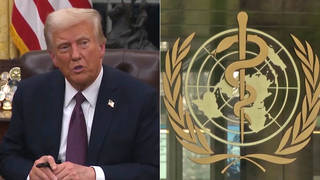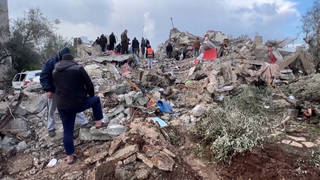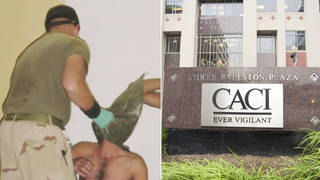
Related
Topics
Guests
- Douglas Johnsonexecutive director of the Center for Victims of Torture and the past president of the National Consortium of Torture Treatment Programs.
- Dr. Steven Milesauthor of Oath Betrayed: Torture, Medical Complicity, and the War on Terror. He is a professor of medicine at the University of Minnesota Medical School and a faculty member of its Center for Bioethics. He is also a practicing physician.
“In today’s world there are more healthcare professionals involved in the design and structuring of torture than there are involved in providing care for survivors,” said Douglas Johnson, executive director of the Center for Victims of Torture in Minneapolis. We also speak with professor Steven Miles, author of “Oath Betrayed: Torture, Medical Complicity, and the War on Terror.” [includes rush transcript]
Transcript
AMY GOODMAN: We turn now to the issue of torture. Minneapolis is the home of the Center for Victims of Torture, an organization that works to heal the wounds of torture on individuals, their families, their communities, and to stop torture worldwide.
We’re joined by the center’s executive director, Douglas Johnson. Doctor Steven Miles is also with us. He’s a professor of medicine at the University of Minnesota Medical School and a faculty member of its Center for Bioethics. He is the author of the book Oath Betrayed: Torture, Medical Complicity, and the War on Terror.
But before we go to our guests, I want to play an excerpt from Wednesday’s Democratic debate at Dartmouth College. It aired on MSNBC and was moderated by Tim Russert.
TIM RUSSERT: I want to move to another subject, and this involves a comment that a guest on Meet the Press made, and I want to read it as follows: “Imagine the following scenario. We get lucky. We get the number three guy in al-Qaeda. We know there’s a big bomb going off in America in three days, and we know this guy knows where it is. Don’t we have the right and responsibility to beat it out of him? You could set up a law where the president could make a finding or could guarantee a pardon.” President Obama, would you do that as president?
SEN. BARACK OBAMA: America cannot sanction torture. It’s a very straightforward principle and one that we should abide by. Now, I will do whatever it takes to keep America safe. And there are going to be all sorts of hypotheticals in emergency situations, and I will make that judgment at that time. But what we cannot do is have the president of United States state as a matter of policy that there is a loophole or an exception where we would sanction torture. I think that diminishes us, and it sends the wrong message to the world.
TIM RUSSERT: Senator Biden, would you allow this presidential exception?
SEN. JOSEPH BIDEN: No, I would not. And I met up here in New Hampshire with 17 four- —- three— and four-star generals, who after my making a speech at Drake Law School pointing out I would not under any circumstances sanction torture, I thought they were about to read me the Riot Act. Seventeen of our four-star and three-star generals said, “Biden, will you make a commitment you will never use torture?” It does not work, and it’s part of the reason why we got the faulty information on Iraq in the first place, because it was engaged in by one person who gave whatever answer they thought there were going to give in order to stop being tortured. It doesn’t work. It should be no part of our policy ever. Ever.
TIM RUSSERT: Senator Clinton, this is the number three man in al-Qaeda. We know there’s a bomb about to go off, and we have three days. And we know this guy knows where it is. Should there be a presidential exception to allow torture in that kind of situation?
SEN. HILLARY CLINTON: You know, Tim, I agree with what Joe and Barack have said. As a matter of policy, it cannot be American policy, period. I met with those same three- and four-star retired generals, and their principal point, in addition to the values that are so important for our country to exhibit, is that there is very little evidence that it works. Now, there are a lot of other things that we need to be doing that I wish we were: better intelligence; making our, you know, our country better respected around the world; working to have more allies. But these hypotheticals are very dangerous, because they open a great big hole in what should be an attitude that our country and our president takes toward the appropriate treatment of everyone, and I think it’s dangerous to go down this path.
TIM RUSSERT: The guest who laid out this scenario for me with that proposed solution was William Jefferson Clinton last year. So he disagrees with you.
SEN. HILLARY CLINTON: Well, he’s not standing here right now.
TIM RUSSERT: So there is a disagreement?
SEN. HILLARY CLINTON: Well, I’ll talk to him later.
AMY GOODMAN: That was an excerpt from Wednesday’s Democratic presidential debate at Dartmouth College. We are joined now in St. Paul, Minnesota, by Douglas Johnson of the Center for Victims of Torture and Dr. Steven Miles, author of the book Oath Betrayed: Torture, Medical Complicity, and the War on Terror.
Dr. Miles, let’s begin with you. Your response?
DR. STEVEN MILES: What Joe Biden said was that he would not ever order torture. What Ms. Clinton said was that we would never have a policy for torture, but she did not rule out the possibility of an executive order for torture in a specific circumstance. And Barack Obama was very hard to read on this matter. So the only clear statement came from Joe Biden, and I think that further clarification on this needs to be addressed.
It’s not just that there’s no evidence, but the National Intelligence University, in a huge analysis of this last year, in two thousand — well, actually, earlier this year, that there is no evidence that torture works, and furthermore that it leads subjects to provide misinformation and to become recalcitrant to cooperation with providing information that we need.
AMY GOODMAN: How did you get involved with this issue?
DR. STEVEN MILES: Well, when I saw the pictures of Abu Ghraib, I was stunned. And the question was: Where was the prison medical staff? Why didn’t they blow the whistle on it? And I figured that what they’d done is that they had attempted to blow the whistle on it and that their reports had been suppressed. And what I found was that the Armed Forces Institute of Pathology was suppressing information about deaths from torture and that the medical staff, including psychiatrists and psychologists, were actually integrated into the system of devising course of interrogations.
AMY GOODMAN: And so, you wrote this book Oath Betrayed. When we were doing the Burma segment, you made an interesting comment.
DR. STEVEN MILES: Well, you take the speaker that you had. He was talking about the use of dogs, close confinement in crowded cells, meal deprivation. All of these are techniques which are currently approved against the use of prisoners that we’re holding, which, by the way, I’d point out, as in Burma, 85 percent in Iraq are innocent or ignorant of insurgency activity. And it is very difficult for us to say to Burma, “Don’t do these techniques,” when we have set as a matter of national policy that in national emergency, given national sovereignty, that we can embark on torture.
AMY GOODMAN: The ticking time bomb theory that Tim Russert posed?
DR. STEVEN MILES: I’ve looked at every instance of a ticking time bomb that’s been proposed in the war on terror. All of them are not what the government has said they are. In fact, basically there is never a circumstance where you know that a particular prisoner has a particular information and will yield with a particular amount of pressure. In fact, gathering intelligence is a matter of pulling information gradually from a number of sources, who you recruit through rapport building.
One of the fascinating things about the ticking time bomb scenario is that it has elicited bad information, which has sent our troops on dangerous and fatal missions, as they go and chase down wild goose chases to get bad — chasing down bad information. And furthermore, the sole source for the information that bioweapons were being developed jointly by Saddam Hussein and al-Qaeda came from a guy that we kidnapped in Sweden, took to Egypt and tortured, and that made it to the U.N. and was part of the authorization to go to war.
AMY GOODMAN: We have been doing extensive coverage of the debate in the American Psychological Association. They, this year, ultimately did not pass a moratorium on psychologist involvement in coercive interrogations. Can you talk more about what is going on there and the contrast with the American Medical Association and American Psychiatric Association?
DR. STEVEN MILES: Essentially, what the American Psychological Association has said is that psychologists may work with interrogators to break persons down. And it turns out that that was the specific agenda all the way from the beginning, including when military people were stacked on their interrogation policy committee.
The directive from then-President Koocher, as expressed in his emails, said as follows: the goal of such psychologists’ works will ultimately be the protection of others, innocents, by contributing to the incarceration, debilitation or even death of the potential perpetrator, who will often remain unaware of the psychologists’ involvement.
And then, a month later he said to that same American Psychological Association policy committee, “I have zero interest in entangling the American Psychological Association with nebulous, toothless, contradictory and obfuscatory treaties that comprise 'international law.' Rather, I prefer to see the American Psychological Association take principled stand on policy issues where psychology has some scientific basis for doing so.” Well, the irony of this is that the scientific evidence weighs against course of interrogation, and the psychologists should have put the brake on the CIA, but in fact they worked with the CIA to develop these techniques, which then spread through the Army, and it resulted in enormous damage.
AMY GOODMAN: How did you get that email of the former president of the APA, Gerald Koocher?
DR. STEVEN MILES: What happened was that there was a task force that was set up to do this. Nine out of the 12 members were related to the military; three weren’t. One, Jean Maria Arrigo, has made the email correspondence to that committee available. And this is being — currently being posted up on various websites.
AMY GOODMAN: We’ve interviewed Jean Maria Arrigo on Democracy Now!
Doug Johnson, your thoughts on this issue? You are the head of the Center for Torture Victims here in Minneapolis. It’s very unusual to have such a center. There are only a few in the United States, is that right?
DOUGLAS JOHNSON: Well, unfortunately, there are over 30 now.
AMY GOODMAN: Oh, over 30.
DOUGLAS JOHNSON: And we all work as closely together as possible to learn from each other. And I think the experience for all of us is that we care for people who the rest of the community would consider innocent victims of torture, but all of those survivors would tell you that they would have said anything, anything at all that was wanted of them, eventually, to get the torture to stop. And so, they’ll confess, they’ll give the information that’s fed to them, because the person who most needs a confession is the torturer. Without that confession, the torturer has no justification for what they’ve done. And the only way that torture states manage the dissidence and the moral — morale and the minds of their torturers is that a confession emerges. And that’s one of the key reasons why truth doesn’t emerge from torture. Anything could emerge. Sometimes it’s a danger.
But one of the big problems of the focus on the ticking time bomb is it’s really an enormous distraction. The focus on just what’s happening in the interrogation center and the tactics of interrogation have obscured, for most of us, and especially our policymakers, what the strategic results of torture are. And one of those key strategic results is this: I spent some time with Alberto Mora, who had been the Navy legal counsel who fought against the torture policy, someone you should have on your show, when we were visiting members of the Senate Intelligence Committee, and he emphasized that the reason we have the Geneva Accords, of course, emerging from the way Allied troops were dealt with by the Nazis and the Japanese prison camps, was the notion that if a soldier knows that they will be treated humanely, when they are trapped and they have no place to go, they have at least the opportunity of surrendering, but if they know they will be treated cruelly, if they will be tortured, if they will be otherwise treated without dignity, then the total incentive for them is to fight to the last man.
And under those circumstances, and under the circumstances we now have in Iraq, when we are overpowering a group with firepower, we have given them the total incentive to fight to the last man. And that endangers American troops right now. Americans die from this policy, because we have falsely thought that the creation of fear keeps us safe, rather than endangers us.
AMY GOODMAN: How do you treat victims of torture at the center?
DOUGLAS JOHNSON: Well, we have a multidisciplinary team.
AMY GOODMAN: How many victims are there now?
DOUGLAS JOHNSON: Well, we believe there are about 30,000 just in Minnesota, at least a half a million in the United States. They’ve come from so many countries. We’ve provided care for people from almost 80 countries.
AMY GOODMAN: And how many are in your center now?
DOUGLAS JOHNSON: We only have the capacity for about 300 a year, which means we have a hundred years of work sitting in the state right now. So one of our key roles is to be the learning center, to learn the impact of torture and what we do about it, and try and engage the broader mainstream healthcare program to do what ought to be done in the healthcare system. That’s an enormous struggle.
So, in addition to our care, we have major programs with as many resources as we could put together to train mainstream survivors. We also have a contract to provide the technical assistance to the other centers in the U.S., and we work with 17 centers in parts of the world where torture is used to try and reinforce them and really broaden the capacity in the world to work with people.
AMY GOODMAN: I think when a lot of people think torture, they think other countries. In our headlines, we read the story of what’s happening in Chicago and the exposes around one of the top police for years, Jon Burge, and his torture victims. What is your response to that?
DOUGLAS JOHNSON: Well, our friends at the Kovler Center in Chicago have been engaged in this case, and one advantage of the treatment centers is also to be able to begin to develop forensic evidence in these kinds of cases. So our colleagues in the human rights community have been really the impetus behind this investigation.
Torture occurs everywhere, and including the United States. What has distinguished us, for the most part, is that in the U.S., when it does occur, we have active investigations and intervention. And that this occurred over a decade in Chicago really indicates a very high level of corruption, which, I would have to say, in the world, where we see torture occurring, there is a very high correlation always with corruption.
AMY GOODMAN: Professor McCoy, who wrote the book A Question of Torture, said psychological torture is worse than physical. Is that true?
DOUGLAS JOHNSON: That was a surprise to me when I arrived at the center 19 years ago, because, again, I had the imagination that it’s the physical. But our clients tell us that the physical, they don’t always remember. I think it’s sort of like a woman who gives birth. Why would she give birth again? There’s something about the actual pain of the event that fades. And what they tell us is that the subject of their nightmares are the psychological forms of torture, the mock executions, observing other people being tortured. But what we have seen is that the processes of psychological torture have become much, much more utilized and more highly sophisticated over the years.
AMY GOODMAN: Professor Miles?
DR. STEVEN MILES: There was a terrific study that was done of Bosnian survivors, came out last year, and what it found was that in terms of causing post-traumatic stress disorder, that physical torture, emotional torture and sexual torture, or the intensity or duration of torture were not associated with a greater or lesser likelihood of PTSD. And so, that emotional torture, such as, say, being forced to witness the rape of a loved one or a mock execution, is just as likely to cause long-term disability as physical torture.
AMY GOODMAN: What about the ones that the U.S. military, CIA, etc., have engaged in, like isolation, sleep deprivation, sensory deprivation?
DR. STEVEN MILES: The means that we have used basically resemble those used by all other countries, with the single exception that we have not used mutilation — that is, cutting off hands or ears, which have been done in some countries. But in terms of the range of physical abuses, from electrical, thermal, hypothermic, beating and various forms of emotional trauma, they look exactly like other countries.
AMY GOODMAN: What do you think of the APA debate, what’s been going on, why the APA hasn’t passed a moratorium?
DR. STEVEN MILES: Well, I can’t really speculate on why. There is a fair amount of speculation, but I think it’s just that. Certainly, when the psychiatrists said that we will not participate in this, they got blown off of these interrogation panels. The APA current position is essentially dovetailed to continue substantial involvement with the Central Intelligence Agency. And furthermore, they very specifically stated that physicians — or psychologists could work in secret prisons with an option of leaving if they wanted, but not with an obligation to call attention to the abuses within secret prisons. And so, the APA policy is fundamentally designed to work with a secret prison system, which is the worst form of danger to prisoners.
AMY GOODMAN: Doug Johnson.
DOUGLAS JOHNSON: I think it’s important to understand — and this is an example of it — that currently in today’s world there are more healthcare professionals involved in the design and structuring of torture than there are those who are involved in providing care for survivors.
AMY GOODMAN: Say that again.
DOUGLAS JOHNSON: There are more healthcare people involved in the design and the instrumentation of torture than there are involved in providing healing for the survivors.
AMY GOODMAN: In this country.
DR. STEVEN MILES: No, around the world.
DOUGLAS JOHNSON: In the world.
AMY GOODMAN: Around the world.
DOUGLAS JOHNSON: In the world. And it is, in many times, because healthcare people get engaged and confused by the same ticking time bomb theories that fuel 24 and other fantasy programs, which have unfortunately seem to be the basis of learning for many of our policymakers. It’s fantasy-driven, and it causes people to do stupid things.
AMY GOODMAN: Dr. Miles?
DR. STEVEN MILES: About 130 countries torture, but of the survivors, somewhere between 20 and 50 percent report seeing a health professional directly involved in supervising the torture. And that doesn’t count the ones who never see the physician who falsely certifies the cause of death as natural causes. So it’s actually around 40 percent of survivors actually see the health practitioner involved in the torture. And, you know, as Doug said, about 1 percent of the torture victims in Minnesota are actually getting treatment.
AMY GOODMAN: And finally, Doug Johnson, your view of the whole controversy within the American Psychological Association? And have you taken a stance on this, your center?
DOUGLAS JOHNSON: Well, we see ourselves as a technical and professional organization, and we try and feed people the information that comes from our work. I have to say, though, that in my view there’s a strong parallel here with what happened in Uruguay at the height of the repression in Uruguay. And here, you had really a struggle between two groups of psychologists. The dominant group in Uruguay were psychoanalytic; the emerging group were behavioralists, and they were second-class citizens in the psychological world. Therefore, they allied themselves with the military in designing systems of torture, of designing the whole structure of what was called Libertad prison, so that it became an ongoing instrument of torment and disruption and psychological dissonance within the minds of the prisoners, a situation that was so bad that it was the very first report from the ICRC that was released to the public, the second only being what we know about in Guantánamo. And so, it’s hard for us not to see those parallels, that there may be a bigger struggle in the way psychology is going, and some are aligning the wrong way.
AMY GOODMAN: Well, I want to thank you both very much for joining us, Steven Miles, author of the book Oath Betrayed: Torture, Medical Complicity, and the War on Terror; and Doug Johnson, head of the center for torture victims here in St. Paul, Minneapolis. The specific name is the Center for Victims of Torture. Thank you so much.












Media Options